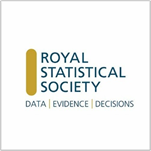The statistical podcast showcase: A wealth of insights for statisticians
Dr. Vanessa Cave
01 December 2021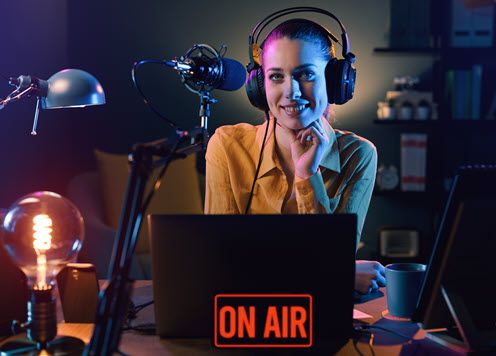
I’m a fan of podcasts, especially those that make me think, intrigue me, teach me something new, and/or challenge my world view. And when it comes to entertaining and engaging podcasts, we are spoilt for choice! So, if you’re on the hunt for a new podcast to become engrossed in, here are a few gems that offer a statistical flavour.
The power of More or Less
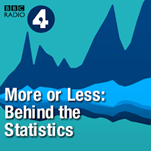
This renowned BBC Radio 4 podcast is “devoted to the powerful, sometimes beautiful, often abused but ever ubiquitous world of numbers". An investigative podcast, More or Less takes you on a journey to explain and explore the accuracy of statistics encountered in our daily lives in an entertaining and accessible way. As the podcast typically tackles statistical issues related to news topics in the UK, many of the recent episodes have focussed on COVID-19. Fascinating as these episodes are (and they are extremely interesting and informative!), I’d encourage you to checkout the back catalogue. There’s a wealth of intriguing episodes, such as:
- Are married women flipping miserable? Measuring happiness, university access in Scotland, plus will one in two people get cancer?
- Hay Festival Special What does it mean to say that the UK is the fifth largest economy in the world? Plus, how to answer multiple choice questions.
- Sex, coal, missing people and mice Are we having less sex? And what happened to coal?
- Are natural disasters on the rise? Investigating the numbers in the news; has the number of natural disasters really quadrupled in the last forty years?
Stories and statistics: Stats + Stories
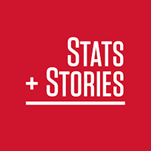
A collaboration between the American Statistical Association and Miami University, Stats + Stories explores the “statistics behind the stories and the stories behind the statistics”. In each episode an expert guest (or guests) shares a story on a topical statistical idea, issue or myth. In a nutshell, they use statistics to study a story and use stories to bring statistics to life. Recent episodes include:
- Conspiracy dissemination dilemma The ways in which misinformation and conspiracies move through social media networks (guest: Sander van der Linden)
- A chance for good Use of data, statistics and data science for public good (guests: Caitlin Augustin and Matt Brems)
- No one is poisoning your kids' candy, trust the numbers Along with Halloween comes the worry, the concern, the fear that in fact, someone will be poisoning our kids’ candy.
- The right to be left alone With the ubiquity of technology in our lives, and Big Data, have come with concerns over privacy, security, and surveillance.
The unexpected role of statistics: The Random Sample
Funded by the Australian Research Council Centre of Excellence for Mathematical and Statistical frontiers, this podcast shares stories about mathematics, statistics and the people involved. It provides a fascinating glimpse into the world of statistics, and how statistics often play a crucial role in areas we don’t expect. Some of my favourite episodes include:
- Pioneering women - Helen Newton Turner A look back at the life of Helen Newton Turner, an Australian statistician and statistical geneticist who made some amazing contributions to science starting in the 1930s and spanning over a 40-year career.
- Weighing up evidence in criminal courts and at a king's burial site Few things have changed the legal system over the past few decades as much as the use of forensic evidence – most notably, DNA.
- Hacking your lower brain to Improve predictions Investigates the disturbing possibility that companies get us to do what they were predicting - or at least push us closer to our predicted behaviour.
- Success, luck and second chancesWhen things go your way – or don’t go your way – how much of that is luck? Do we overvalue or undervalue a process or a person's performance because of how things eventually turn out? Do we need to take into account things out of our control?
Insights from renowned statisticians: Royal Statistical Society
The Royal Statistical Society is one of most renowned and prestigious statistical societies in the world. Its events often feature distinguished statisticians talking about interesting things. Luckily for us, many of these talks have been recorded and been made available as a podcast, including:
- Podcast with Richard Saldanha on statistical machine learning and quantitative finance.
- Use of data and research at the World Health Organisation with Dr Maria Van Kerkhove.
- Real-time epidemiology, statistics and modelling with Professor Christl Donnelly.
- A Bayesian analysis of animal movement data with Dr Colin Gillespie.
Economics with a statistical lens: Planet Money

This popular NPR produced podcast uses playful storytelling to explore important and complex topics related to the economy – generally that of the USA’s. Although focused on economics, statistics permeates throughout this podcast. Thus, listening to this podcast not only teaches you about popular economic issues but it also provides you with insights into how individuals, businesses and governments use statistics in their decision making. Some episodes from 2021 are:
- The wheat whisperer Southeast Asia is one of the biggest growth markets for American wheat. Where did this taste for wheat come from and who is responsible?
- Two indicators: will remote work kill the office? Armed with studies, historical examples, theories on efficiency and happiness and from their closet studios, the presenters bring their indicators for the future of the office.
- How uncle Jamie broke jeopardyJames's Jeopardy! strategy wasn't a reckless gamble. It was informed by probability.
- Emission impossible Carbon offsets have become a popular tool to combat climate change. But how effective are they?
Provocative perspectives: Freakonomics Radio
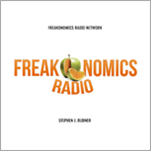
Ok, so like Planet Money, another USA podcast that discusses economics with statistics and statistical thinking featuring strongly. A great podcast for those of us interested in socio-economic issues and statistics, Freakonomics offers new perspectives that may change the way you think. One of the first episodes I listened to, provocatively titled How much do we really care about children? discusses car seats, the unconvincing safety data and the unintended consequence of the policies we create. To help whet your appetite, here are a few other episodes:
- Is there really a “Loneliness epidemic”? That’s what some health officials are saying, but the data aren’t so clear. What’s known (and not known) about the prevalence and effects of loneliness — including the possible upsides.
- Does Hollywood still have a princess problem? For decades, there’s been a huge gender disparity both on-screen and behind the scenes. But it seems like cold, hard data — with an assist from the actor Geena Davis — may finally be moving the needle.
- Speak softly and carry Big Data Do economic sanctions work? Are big democracies any good at spreading democracy? What is the root cause of terrorism? It turns out that data analysis can help answer all these questions — and make better foreign-policy decisions.
- The data-driven guide to sane parenting Humans have been having kids forever, so why are modern parents so bewildered? The economist Emily Oster marshals the evidence on the most contentious topics — breastfeeding and sleep training, vaccines and screen time — and tells her fellow parents to calm the heck down.
- Hacking your lower brain to improve predictions Do you ever stop and think about how much time you spend on your mobile phone, or binge-watching your favourite TV show? Could you predict how much time that will be tomorrow, or the next day, or the next week?
About the author
Dr Vanessa Cave is an applied statistician interested in the application of statistics to the biosciences, in particular agriculture and ecology, and is a developer of the Genstat statistical software package. She has over 15 years of experience collaborating with scientists, using statistics to solve real-world problems. Vanessa provides expertise on experiment and survey design, data collection and management, statistical analysis, and the interpretation of statistical findings. Her interests include statistical consultancy, mixed models, multivariate methods, statistical ecology, statistical graphics and data visualisation, and the statistical challenges related to digital agriculture.
Vanessa is currently President of the Australasian Region of the International Biometric Society, past-President of the New Zealand Statistical Association, an Associate Editor for the Agronomy Journal, on the Editorial Board of The New Zealand Veterinary Journal and an honorary academic at the University of Auckland. She has a PhD in statistics from the University of St Andrew.
Popular
Related Reads


